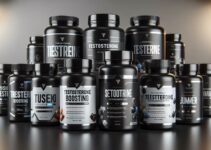Imagine the delicate dance of a seed being planted in fertile soil, a process that requires the perfect conditions for growth. Just as the soil is crucial for the seed's development, testosterone plays a vital role in male fertility. But what happens when testosterone levels are not optimal? Could testosterone boosters be the missing piece in the fertility puzzle? Understanding the intricacies of testosterone and its impact on male fertility is essential in considering the potential benefits of testosterone boosters.
Key Takeaways
- Testosterone boosters can improve sperm production and quality, potentially enhancing male fertility.
- These boosters offer natural alternatives to support hormonal balance and optimize fertility.
- Increased testosterone levels may address low sperm count and poor sperm motility.
- Testosterone boosters have the potential to positively impact fertility outcomes, but consultation with a healthcare professional is crucial before starting supplementation.
Importance of Testosterone for Male Fertility
Testosterone plays a crucial role in male fertility by regulating sperm production and maintaining reproductive function. Optimal testosterone levels are essential for maintaining hormonal balance, which in turn impacts fertility. Testosterone is not only responsible for the development of male reproductive tissues, but also for promoting sperm production. It directly influences the quality and quantity of sperm produced, thereby affecting reproductive health.
Sufficient testosterone levels are necessary for the process of spermatogenesis, where sperm cells are developed. This hormone also supports the maturation of sperm cells and their ability to fertilize an egg. Research has shown that low testosterone levels can lead to decreased sperm quality, affecting male fertility. Additionally, testosterone is involved in the regulation of other hormones that are crucial for reproductive function. Therefore, maintaining adequate testosterone levels is vital for overall reproductive health in men.
Understanding Testosterone Boosters
With the importance of testosterone in male fertility established, it is crucial to comprehend the role and efficacy of testosterone boosters in maintaining hormonal balance and supporting reproductive health. Testosterone boosters are supplements that are designed to increase the production of testosterone in the body. They work by directly increasing testosterone levels or by preventing the conversion of testosterone into estrogen. Understanding the benefits of testosterone boosters is essential. These supplements can potentially improve sperm quality, increase sperm count, and enhance overall reproductive function. However, it is important to be aware of potential side effects. While testosterone boosters are generally considered safe when used as directed, they may lead to side effects such as acne, hair loss, and increased risk of prostate issues. It is crucial to consult with a healthcare professional before starting any testosterone booster regimen, especially for individuals with existing medical conditions or those taking medications. Understanding the mechanisms, benefits, and potential side effects of testosterone boosters is essential for making informed decisions about their use in supporting male fertility.
Impact of Testosterone on Sperm Production
An optimal level of testosterone in your body is crucial for the efficient production of sperm. Testosterone plays a vital role in the development and maturation of sperm cells, as well as the maintenance of overall reproductive health. It directly impacts the process of spermatogenesis, which is the production of sperm, and influences sperm quality. When testosterone levels are low, it can lead to decreased sperm production and reduced sperm quality, potentially affecting fertility. Conversely, adequate testosterone levels are essential for optimal sperm production and overall reproductive function.
| Testosterone Levels | Impact on Sperm Quality |
|---|---|
| Low | Decreased production and quality of sperm |
| Adequate | Essential for optimal sperm production and quality |
Research indicates that low testosterone levels are associated with poor sperm morphology, motility, and concentration, all of which are crucial factors in male fertility. Therefore, maintaining an optimal balance of testosterone is essential for ensuring healthy sperm production and quality. If you are experiencing fertility issues, it is advisable to consult with a healthcare professional to assess your testosterone levels and discuss potential treatment options.
Benefits of Testosterone Boosters for Fertility
Boosting testosterone levels can potentially enhance male fertility by improving sperm production and quality. Testosterone boosters, when used in conjunction with a healthy lifestyle, can offer natural alternatives to support hormonal balance and optimize fertility. By increasing testosterone levels, these boosters may aid in addressing issues such as low sperm count and poor sperm motility, which are crucial factors in male infertility. Furthermore, elevated testosterone levels can lead to improved libido and sexual function, contributing to a higher frequency of intercourse and thereby increasing the chances of conception.
Research suggests that testosterone plays a pivotal role in the regulation of spermatogenesis, the process of sperm production. Therefore, testosterone boosters have the potential to positively impact fertility outcomes by promoting the development of healthy, motile sperm. It's important to note that while testosterone boosters can be beneficial for certain individuals with suboptimal testosterone levels, they should be used judiciously and under the guidance of a healthcare professional to avoid potential adverse effects. In conclusion, testosterone boosters offer a promising avenue for enhancing male fertility by addressing hormonal imbalances and supporting optimal sperm production.
Risks and Considerations for Using Testosterone Boosters
Considerations for the use of testosterone boosters in addressing male fertility should take into account potential risks and side effects that may arise from their supplementation. While testosterone boosters can have positive effects on male fertility, it's essential to be aware of potential side effects. These may include acne, hair loss, increased risk of prostate enlargement, and decreased testicular size. Furthermore, long-term use of testosterone boosters may lead to a reduction in the body's natural production of testosterone, potentially resulting in infertility once the supplementation is discontinued.
It's crucial to consult with a healthcare professional before starting any testosterone booster regimen, especially for individuals who are trying to address fertility concerns. They can provide personalized guidance based on individual health history and concerns. Additionally, monitoring hormone levels and overall health during the use of testosterone boosters is essential to detect and address any emerging side effects promptly.
Understanding and weighing the potential risks and benefits of testosterone boosters is crucial in making an informed decision regarding their use for addressing male fertility. Always prioritize health and safety when considering testosterone booster supplementation.
Frequently Asked Questions
Can Testosterone Boosters Help With Other Aspects of Male Reproductive Health, Such as Erectile Dysfunction or Libido?
Yes, testosterone boosters can help with erectile dysfunction and libido. Natural ways, such as lifestyle changes or supplements, may aid in boosting testosterone levels. It's important to consult with a healthcare professional before starting any testosterone-boosting regimen.
Are There Any Natural Ways to Increase Testosterone Levels for Male Fertility, Aside From Using Testosterone Boosters?
Improving male fertility through natural remedies involves optimizing exercise and sleep habits, along with incorporating herbal supplements. These methods can help regulate testosterone levels, supporting overall reproductive health without the use of testosterone boosters.
How Long Does It Typically Take to See Improvements in Male Fertility After Starting a Testosterone Booster Regimen?
Typically, improvements in male fertility from starting a testosterone booster regimen can take several weeks to months. It's crucial to monitor for side effects and risks during this time and consult with a healthcare professional.
Are There Any Specific Dietary or Lifestyle Changes That Can Enhance the Effectiveness of Testosterone Boosters for Male Fertility?
To enhance the effectiveness of testosterone boosters for male fertility, consider dietary modifications such as increasing intake of zinc and vitamin D, and reducing alcohol consumption. Additionally, incorporating regular exercise routines can further support fertility.
What Are the Potential Long-Term Effects of Using Testosterone Boosters for Male Fertility, Particularly in Terms of Overall Health and Well-Being?
Using testosterone boosters for male fertility may pose potential risks to your overall health and well-being. Health implications include an increased risk of cardiovascular issues, prostate enlargement, and mood disturbances. It is crucial to weigh these considerations.

